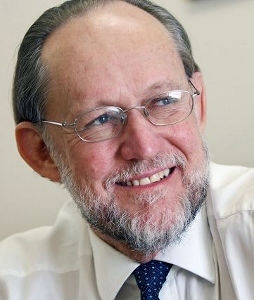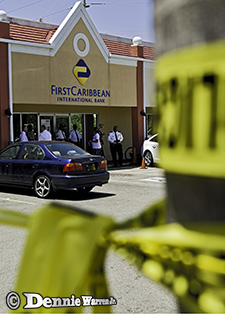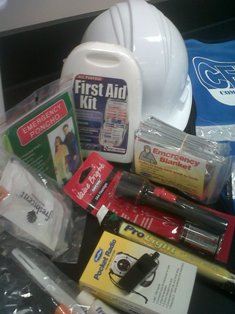Archive for May 17th, 2012

Cayman tops 183 countries for compliance
(CNSBusiness): Preliminary independent research by a professor who specialises in offshore finance has found that the Cayman Islands is one of only two countries that follows proper due diligence required under international money laundering regulations. The early findings of Professor Jason Sharman of Griffith University in Australia, whose work focuses on offshore centres, reveal that Cayman was top of the table of over 183 countries because it required a full suite of identification documentation. The findings were welcomed by Cayman Finance chair Richard Coles, who said the work confirms what Cayman Islands officials and industry representatives have been saying all along. Read more on CNS Business

Judge’s retirement leaves gap on judicial commission
 (CNS): Following Justice Richard Ground’s recent retirement from his post as Chief Justice of Bermuda, he has also tendered his resignation from the Cayman Islands Judicial and Legal Services Commission. According to government officials, Justice Ground left the commission back on 28 March and the governor needs to appoint a replacement from outside the Cayman Islands. Ground was one of two overseas members of the commission, which fulfils Section 105 (1)(d) of the 2009 Constitution that says that two of the commission members appointed by the governor must have either held or still hold high judicial office in a Commonwealth country other than Cayman.
(CNS): Following Justice Richard Ground’s recent retirement from his post as Chief Justice of Bermuda, he has also tendered his resignation from the Cayman Islands Judicial and Legal Services Commission. According to government officials, Justice Ground left the commission back on 28 March and the governor needs to appoint a replacement from outside the Cayman Islands. Ground was one of two overseas members of the commission, which fulfils Section 105 (1)(d) of the 2009 Constitution that says that two of the commission members appointed by the governor must have either held or still hold high judicial office in a Commonwealth country other than Cayman.
Governor Duncan Taylor thanked Justice Ground for his commitment to the commission and is now considering potential candidates to replace him on the eight man board which deals with the recruitment, promotion and discipline of the local judiciary. The commission is chaired by Dan Scott and the current members include Dara Flowers-Burke, Sir John Chadwick, Edward Zacca, Sir David Simmons, Richard Coles and Charles Jennings
Cayman’s top judge recently pointed to the growth of commissions such as these in the region and said they posed a threat to the independence of the judiciary. At the UCCI annual conference in March Chief Justice Anthony Smellie said the trend towards extra-judicial bodies overseeing judges, such as Cayman’s Judicial Legal Services Commission (JLSC), had the potential to encroach on their autonomy and to have a negative influence on their impartiality.
For more information on the Judicial and Legal Services Commission visit www.judicialandlegalservicescommission.ky

Doing business with vultures
Hearing news such as that recently revealed about Dart Management collecting over €400million (US$500m) from the Greek government when the people of that country are suffering so much always makes me question the unbridled free market. The fact that any group of investors could make such a killing on the backs of human suffering by being so unscrupulous should be a concern to anyone that has an ounce of compassion. But knowing it is Cayman’s largest investor that’s involved this time also makes it frightening.
The previous Labour government in the UK passed legislation to prevent vulture funds profiteering on old debts of very low income countries in British courts, but this does not apply to new debts of other countries and the practice is not illegal. It surely is, however, immoral.
Dart has often been praised here in the Cayman Islands because of the group’s charitable donations, its investment in infrastructure and the creation of local jobs. At present, many people are looking to the firm to save Cayman from its own economic struggles (and the ever growing Mount Trashmore) with the deal it plans to implement with government.
While there are many who are opposed to the ForCayman Investment Alliance, there is still significant support for the proposed deal, which many people think will boost Cayman’s ailing economy.
However, this recent reminder of how it is that the Dart Group really got rich should give us all pause for thought. Even without the proposed alliance with the Cayman Islands government, the Dart group is estimated to already own somewhere between 20-25% of Grand Cayman’s land mass as well as owning numerous businesses, including a large chunk of our liquor trade.
Given the firm’s propensity to deal in such distasteful financial products that have such a direct and significant negative impact on whole communities of people, I am not as convinced as others that the evidence of some charitable tendencies towards Cayman by the Dart Group could guarantee that this little island would always be treated so kindly.
Vulture investors are groups of people who buy the sovereign debt of countries in trouble cheaply then, by holding out against a write-down, they take the gamble of getting paid out in full. Having paid only a fraction of the value for the debt, when they get full repayment they can make a ginormous profit.
In the past Dart was said to have taken some $600 million from Brazil following its 1993 crisis, and over the last few years various vulture fund investors have targeted some of the world's poorest countries, where the debts were run up, not by the regular people who suffer in the end, but by dictatorial regimes. There is some risk, of course, as some countries simply default on the debt, but the vulture funds will use the courts to seize assets from the countries that owe them money.
This week, rather than risk legal action Greece made a repayment of €436m to the owners of its debt, 90% of which has reportedly gone to Dart, while the country’s social system collapsed and rates of suicide soared.
While making a profit is not a crime, and it appears to still be what makes the world go round and is the raison d’etre for so many people, it cannot be moral for anyone to make so much money as a result of the direct suffering of their fellow human beings, even if they are thousands of miles away.
Fortunately, despite the claims of the premier, the debt situation in Cayman is nothing like that of Greece or many of the European countries and so far none of our public debt is in the claws of vulture funds. But surely we should be asking ourselves, given the Dart Group’s involvement in this type of profiteering, could Cayman be vulnerable in other ways.
The current administration appears to be placing its hoped for economic recovery in the hands of Dart, and while the group is certainly rich and in a position to help generate jobs, is it really in the interest of the people of the Cayman Islands to become so dependent on one company that has clearly demonstrated how ruthless it can be when it comes to making money.
The world is still a very uncertain place. The crisis in Greece will have a knock-on impact globally, especially if, as is increasingly likely, it leaves the Eurozone. This, together with Portugal’s financial troubles and the news on Thursday of a run on the banks in Spain, makes it appear that the financial troubles around the world are spiralling out of control and likely to continue impacting our own economy negatively.
No one can say with any certainty what the future holds. But given such instability, government’s decision to do business with the vultures in order to insulate Cayman from further economic turmoil looks increasingly unattractive and even a little bit scary.

Robberies finally falling
 (CNS): The latest police statistics have revealed that robberies in the Cayman Islands fell by over 66% in the first quarter of this year compared to the beginning of 2011. After the islands have been plagued with what seemed to be a constant increase in armed hold ups at banks, shops, gas stations and restaurants, for over two years the RCIPS revealed Thursday that the crime was finally in decline. There were eight robbers in the first three months of 2012 while there had been 24 over the same period in the previous year. However, although robbers were less successful in the start of 2012 they were still not giving up as there were seven attempted robberies in the first quarter this year compared to only 3 attempts at the crime last year leading to a 133% increase.
(CNS): The latest police statistics have revealed that robberies in the Cayman Islands fell by over 66% in the first quarter of this year compared to the beginning of 2011. After the islands have been plagued with what seemed to be a constant increase in armed hold ups at banks, shops, gas stations and restaurants, for over two years the RCIPS revealed Thursday that the crime was finally in decline. There were eight robbers in the first three months of 2012 while there had been 24 over the same period in the previous year. However, although robbers were less successful in the start of 2012 they were still not giving up as there were seven attempted robberies in the first quarter this year compared to only 3 attempts at the crime last year leading to a 133% increase.
Overall the latest statistics reveal a welcome fall in recorded crime for the Royal Cayman Islands Police Service. In the opening quarter of the year with 149 serious crimes in 2012 compared to 156 in 2011. Volume crimes also fell and overall the year open with an almost 12% drop in crime.
The statistics represent crime reported to police in January, February and March and while overall they compare favourably to last year’s figures there are still notable increase in some serious crimes. Eight cases of rape were reported in the opening months of this year compared to only one in the same period of 2011 representing a 700% increase in the crime.
Burglary remained similar with just one less break- in being reported this year compared to last and while assaults increased from 3 last year to 8 in this wounding fell from 8 cases in this first part of 2011 to only one this year a fall of more than 87%. However, police were still dealing with a significant number of firearms and although no one has been arrested so far this year for possession of an imitation firearm there were seven cases relating to the real thing compared to eight during the same period last year a fall of only 12.5%.
Meanwhile, although traffic offences were down by 4% accidents increased by 37% this year compared to last and there was also one fatal accident on Cayman’s roads in February.
See latest police statistics below

Police report surge in burglaries
 (CNS): Following a spate of burglaries on Grand Cayman over the past few weeks the RCIPS is warning the public to be extra vigilant and to keep a record, including serial numbers, of all valuables but in particular electrical items and the burglars’ goods of choice – laptops. The police say that overall burglaries have actually fallen slightly so far this year compared to 2011 but they still account for almost 75% of reported serious crime in the Cayman Islands. Officers are urging members of the public and businesses to do their part to ensure that their security measures are appropriate.
(CNS): Following a spate of burglaries on Grand Cayman over the past few weeks the RCIPS is warning the public to be extra vigilant and to keep a record, including serial numbers, of all valuables but in particular electrical items and the burglars’ goods of choice – laptops. The police say that overall burglaries have actually fallen slightly so far this year compared to 2011 but they still account for almost 75% of reported serious crime in the Cayman Islands. Officers are urging members of the public and businesses to do their part to ensure that their security measures are appropriate.
“Burglars can, and will, strike at all times of the day or night – that’s why we need you, the public, to take all necessary steps to make your home/ business secure,” said Chief Inspector Frank Owens. “If a burglar has the choice of two properties, one with security or locked windows and doors, or another without such measures, he or she will take the easy option. Do not have your home or business targeted because it’s an easy option.”
CI Owens advised people to mark their property with a UV pen and take notes of the make, model and serial numbers. “The latest electrical items of choice for burglars operating in the Cayman Islands are laptops. So, please make sure you do all you can to keep your computer as safe as possible. If the property is stolen the chances of it being recovered increase greatly if you can provide the police with such detailed information.”
Owens said the RCIPS is working in partnership with Ecay, and if people provide detailed information, including serial numbers, officers will consider posting that information on the site, both as a crime prevention measure and to appeal for information.
“Remember if you are offered a cut-price computer, and the seller is unable to provide details of purchase history etc., then you should be suspicious – it may in fact be stolen and you could end up being charged with receiving stolen goods,” CI Owens warned.
Crime prevention advice relating to burglaries can be found on the RCIPS website
The RCIPS says the basic steps to follow are:
When you go out, always lock the door and the windows – even if you are not going far.
Window locks, especially on older windows, will help stop people getting in – and remember a burglar is less likely to break in if they have to smash a window.
If you have deadlocks, use them. They make it harder for a thief to get in and out – do not leave the key in an obvious place.
Don’t leave spare keys outside and put keys out of sight within the house.
Use timers for lights and radios if you need to be away from home overnight. This will create the impression someone is in.
Visible burglar alarms, well lit streets and carefully directed security lighting can put burglars off. But make sure that lights don’t disturb your neighbours and alarms turn off after 20 minutes.
Fences at the back of the house may make this area more secure, but walls and solid fencing may let a thief break in without being seen. A good compromise is chain-link fencing, or trellises with prickly shrubs.
Fitting a ‘spy hole’ allows you to see who is at the door before you open it. Having a door chain means you can open the door just a small way to talk to them if you do not know them.
Anyone who wishes to speak to a police officer about crime prevention concerns should contact their local police station.

Imports grow in face of increased fuel costs
 (CNS): Although government states that a growth in imports into the Cayman Islands in 2011 reflects an improvement in the country’s economic fortunes it also admits that the increase to CI$762.0 million compared to CI$690.4 million in 2010 is also due to the increase in prices of some key commodities not least the cost of fuel. The Economics and Statistics Office reported this week that imports grew in 2011 by 10.4 per cent in contrast to last year’s figure which saw a drop of 7.3 per cent. Meanwhile, total exports which comprises largely of re-exports increased significantly by 63.6 per cent to reach $18.1 million compared to the 30.8 per cent decline recorded in 2010.
(CNS): Although government states that a growth in imports into the Cayman Islands in 2011 reflects an improvement in the country’s economic fortunes it also admits that the increase to CI$762.0 million compared to CI$690.4 million in 2010 is also due to the increase in prices of some key commodities not least the cost of fuel. The Economics and Statistics Office reported this week that imports grew in 2011 by 10.4 per cent in contrast to last year’s figure which saw a drop of 7.3 per cent. Meanwhile, total exports which comprises largely of re-exports increased significantly by 63.6 per cent to reach $18.1 million compared to the 30.8 per cent decline recorded in 2010.
“This imports growth in 2011 partly reflects the economy’s recovery, although it also represented increase in prices of key commodities such as fuel,” notes the Hon. Premier and Minister of Finance Mr. McKeeva Bush.
This outturn was largely a result of increases in imports of mineral fuels, lubricants, and related materials (24.6%), miscellaneous manufactured articles (17.9%), food and live animals (15.9%) and machinery and transport equipment (14.2%).
For more information go to the Economics and Statistics website

Grass roots response team completes training
 (CNS): The North Sound Gardens Citizens' Association (NSGCA) will officially become the second ever Community Emergency Response Team this weekend when it formally graduates from the specialist training programme. Fourteen members of the team have undergone nine (9) rigorous weeks of training with HMCI and the Red Cross to increase disaster preparedness and resilience at the grass roots level. The group has met every Friday to learn first aid-CPR, fire safety and suppression, disaster preparedness, stress management, disaster psychology, shelter management, initial damage assessment, vulnerability and capacity assessment.
(CNS): The North Sound Gardens Citizens' Association (NSGCA) will officially become the second ever Community Emergency Response Team this weekend when it formally graduates from the specialist training programme. Fourteen members of the team have undergone nine (9) rigorous weeks of training with HMCI and the Red Cross to increase disaster preparedness and resilience at the grass roots level. The group has met every Friday to learn first aid-CPR, fire safety and suppression, disaster preparedness, stress management, disaster psychology, shelter management, initial damage assessment, vulnerability and capacity assessment.
Deputy Governor Franz Manderson will hand out the graduation certificates at a special ceremony this Saturday at 6:30pm at the Savannah United Church Hall.
The Belford Estates group was the first CERT team established under the Hazard Management Cayman Islands led initiative which is all about improving the community response to any disaster including but not limited to hurricanes.
The next team expected to graduate is a group in North Side group which begins training at the end of this month with the goal of becoming the third CERT team to graduate before the start of the 2012 hurricane season.

Lone witness not enough to convict in gun case
(CNS): A grand court judge found 21 year old Jovin Omar Fuentes not guilty of possession of an imitation firearm after a judge alone trial earlier this month. With only one witness testifying that he had seen a gun during an altercation outside a Bodden Town bar and no other evidence presented by the prosecution, the judge gave the benefit of the doubt to the defendant. Aaron Chisholm told the court that Fuentes came after him with a .38 revolver as he hid behind bushes close to where the two men had fought in the Everglobar car park. Fuentes admitted assaulting Chisholm but denied having a gun.
Although Chisholm, who had been drinking on the night, was accompanied by three other friends at the time of the fight none of them had seen a firearm and Justice Alex Henderson said the crown had not provided any corroborating evidence for Chisholm’s account.
No gun was ever found at Fuentes home despite police going to the address where he was living within hours of the fight and the defendant denied owning a gun.
Fuentes did plead guilty to assault as he admitted starting the fight outside the bar. Having already served almost seven months on remand as he had been in custody since the incident which took place in October last year Fuentes was giving two years’ probation by the judge and released from custody.
See related story here

Register cut-off is HR issue
 (CNS): No new voters can be added to the electoral roll before the referendum because the update period is quarterly, but campaigners for one man, one vote have suggested that this could become a human rights issue as the cut-off occurred before the referendum law was passed. The law was officially gazetted yesterday, 16 May, which means that existing voters who will not be in the Cayman Islands on 18 July when the national poll will take place can now apply for an absentee ballot. However, anyone who had not registered with the Elections Office before the end of April cannot vote in the referendum.
(CNS): No new voters can be added to the electoral roll before the referendum because the update period is quarterly, but campaigners for one man, one vote have suggested that this could become a human rights issue as the cut-off occurred before the referendum law was passed. The law was officially gazetted yesterday, 16 May, which means that existing voters who will not be in the Cayman Islands on 18 July when the national poll will take place can now apply for an absentee ballot. However, anyone who had not registered with the Elections Office before the end of April cannot vote in the referendum.
Although this is as a result of the existing law and not a government policy, the OMOV campaigners have said that government could make an amendment to the election law in order to facilitate new voters. The register closes each quarter to give the public time to review or object to new names on the list over issues of entitlement and if they so wish raise objections. The register is also checked by a magistrate to ensure all the people on the roll have the lawful right to vote.
The recent revelations that government has, in accordance with the new constitution, dropped the need for those with Caymanian Status to also be naturalized before being eligible to vote could also have seen the register boosted before the referendum, but because the list closed at the end of April it is unlikely many new voters would have had the chance to beat the cut-off date.
Johann Moxam, one of the grass roots campaigners, said that the people should pressure their MLAs to make the change to the law, which will give those who want to vote and are entitled to vote the right to do so. “The law can be changed, and given the importance of this vote, we want the public to put pressure on their representatives to ensure that everyone has the right to take part in the democratic process,” he said.
Sharon Roulstone said that during the campaign to collect signatures for the one man, one vote petition the volunteers managed to get a number of new voters to register and left forms with many more. But she said she was concerned that not everyone had made the deadline.
“People who had never even had any interest in politics before expressed a desire to become registered as a result of this campaign,” she said, adding that they were now being disenfranchised because of the early cut-off point.
She said that this was another hurdle to add to those placed by government in its efforts to ensure the failure of its own referendum. This also places the ‘yes’ campaign at a further disadvantage than if the people-initiated referendum had been allowed to progress as that ballot was planned for November, which would have given those entitled but not registered the time to get on the electoral roll.
With the implementation of the Bill of Rights this November, campaigners for OMOV say the cut-off raises a question of human rights, especially as the premier announced the date of the referendum literally days before the legal cut off point for the quarterly update of the register. The OMOV movement believes that there is time for the government to make an amendment to the law and open the register for another month, allowing people to partake in what will be an historic national referendum.
The premier has denied that his announcement was ‘planned’ to prevent people from being added. He said the date was cut off because of the law and not because of his government.
McKeeva Bush has stated that the July date was selected in order to give government time to implement the changes before the May 2013 general election if the 'yes' vote is successful. However, those who launched the petition for a referendum on the subject have persistently pointed out that the Boundary Commission has already done the work required to create the single member constituencies and that the Elections Office was already in a position to hold the May 2013 election under the system of OMOV.
At present the ‘yes’ campaign will need close to 8,000 votes to carry the day as a result of the high threshold set by government for 50% of the electorate plus one voter, rather than a majority of the turnout. However, if government was to change the law and allow more registrations, then they say the ‘yes’ vote will require a greater number to win and change Cayman’s voting system to the more equitable and accountable mode of one man, one vote in single member constituencies.
According to the law that has now been gazetted, the usual rules for elections will apply, which means registered voters can apply for mobile or absentee voting, and although referendum day will be a holiday, no liquor can be sold while the polling stations are open.
See the Referendum Law below.

Experts to map Cayman infrastructure hazards
 (CNS): The Overseas Countries and Territories R3i – Regional Risk Reduction Initiative – is holding a conference in the Cayman Islands next week examining the risks face by small islands in the region. Experts will be examining the achievements and progress of R3i to date but they will also be focusing on the potential hazards on Grand Cayman and mapping critical buildings and infrastructure. With funding provided by the European Union R3i looks at strategies to address these potential hazards brought about by climate change and the risks faced by low lying coastal areas.
(CNS): The Overseas Countries and Territories R3i – Regional Risk Reduction Initiative – is holding a conference in the Cayman Islands next week examining the risks face by small islands in the region. Experts will be examining the achievements and progress of R3i to date but they will also be focusing on the potential hazards on Grand Cayman and mapping critical buildings and infrastructure. With funding provided by the European Union R3i looks at strategies to address these potential hazards brought about by climate change and the risks faced by low lying coastal areas.
The projects are implemented by the United Nations Development Program (UNPD) and seek to address the risk and exposure of small islands by providing a network of regional infrastructure, programmes, policies and protocols to strengthen the capacity to predict and prepare for natural hazards. Experts say the goal is to improve resilience and reduce risk and subsequent loss. Hazard mapping and vulnerability assessment, as well as modeling to inform planning and development processes are also part of the R3i remit.
The conference opens on Sunday 20 May at the Marriott Hotel with the first three days focusing on geographic information systems training followed by a number of meetings and presentations relating to the progress to date.
The territories covered by the programme include eleven British and Dutch overseas countries and territories. AS well as the Cayman Islands, Anguilla, Aruba, British Virgin Islands, Montserrat, Turks and Caicos, Bonaire, Curacao, Sint Maarten, Saba and Sint Eustatius are covered by the initiative.